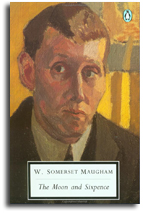Books |
Somerset Maugham: The Moon and Sixpence
By
Published: May 21, 2023
Category:
Fiction
Spring in New York is specific for me. It’s about important moments, people I’m seeing, memorable ideas and emotions. The Spring of 2023 is, for me, the Spring of Van Gogh. Knowing I had tickets to the Members Preview of the Met Museum’s show of Van Gogh’s “Cypresses,” I streamed “At Eternity’s Gate,” Julian Schnabel’s film about Van Gogh, for about the third time. Paul Gauguin is a significant figure in that film — he’s Van Gogh’s comrade in his last years in the South of France. And he’s the subject of a novel. Not just any novel. A novel by Somerset Maugham. This novel….
We think we know the people in our lives. And why not? We know their past and their stories, their quirks and jokes, their strengths and foibles. And because we tend to see the future as much like the present — only with more money, some lines in our faces and cooler cars — we think we can predict how our friends and loved ones will age.
And then someone goes and gets a sex change. Shows up astride a motorcycle, with an American flag on the back of a jean jacket. Has a meltdown over some political issue and stocks the house with weapons.
We see such people as Exceptions. After all, most of us keep on going, with our old ideas, to the end of the line. Wisdom lies in the Middle Path, the balanced life, the known way. So those Life-Changers have to be freaks, don’t they?
Lord knows, it’s easier to think that than to wonder: Is it possible that we really don’t know anyone? That we are, in the end, strangers to one another — no matter how close we are? And that, if we are not energetic, we are strangers to ourselves as well?
That’s the issue Somerset Maugham addresses in ‘The Moon and Sixpence,’ his 1919 novel about Charles Strickland. When we meet him, Strickland is a London stockbroker and a bore. Married 17 years. Two kids. No opinions of note. ‘There was no reason to waste one’s time over him,’ the narrator — a stand-in for Maugham — concludes.
But then Strickland bolts. Leaves the wife and kids behind and heads to Paris. Another woman? Everyone assumes so. The narrator goes to Paris on a mission. And finds Strickland alone.
Strickland’s explanation: He wants to paint. Yes, he’s 40. He doesn’t know if he has talent. But nothing matters — he must paint.
‘You are a most unmitigated cad,’ the narrator says.
Strickland is unmoved. ‘Now that you’ve got that off your chest,’ he says, ‘let’s go and have dinner.’
What are we to make of this man? He lives like a savage. His morals are off the charts. ‘Love is a disease,’ he says. ‘Women are the instruments of my pleasure: I have no patience with their claim to be helpmates, partners, companions.’
In short, a wretched guy. But then there is the matter of his art — which just might be very great indeed. Do we judge a man only by his work? Or only by his relationships? Or by some combination of the two? [To buy the paperback from Amazon,, click here. For the Kindle edition, click here.]
‘The Moon and Sixpence’ — like almost all of Maugham — is hugely entertaining. Its 217 pages zip by, and it’s entirely possible to read them just for the story. And it’s quite a tale: baffled friends in London, ruined women in Paris and a bizarre end in Tahiti, where we are encouraged to make a connection between the fictional Strickland and the very real painter, Paul Gauguin.
English teachers love this book for its issues; it’s tailor-made for us to sit in judgment of its main character. Fewer wonder what it might be like to be Charles Strickland — to need to create regardless of the cost. Maybe you will be that reader.


